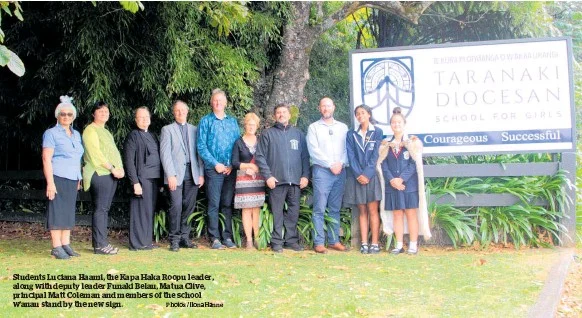
Unveiling school’s new Maori name reflects kura’s bicultural journey
Students Luciana Haami, the Kapa Haka Roopu leader, along with deputy leader Funaki Belau, Matua Clive, principal Matt Coleman and members of the school w’anau stand by the new sign.
Stratford Press / 20 Apr 2022 / Ilona Hanne
Photos / Ilona Hanne
On a warm and sunny autumnal day last Tuesday, students, teachers, w’anau and friends of Taranaki Diocesan School gathered under the trees for an important moment in the school’s journey — the unveiling of a Māori name for the school.
“‘e te ‘ui’uinga e whakaae ana koutou te ingoa ‘Te Kura o Pi’opatanga o W’akaa’urangi’?”
When Matua Clive Tongaaw’ikau (Araukuuku ‘apu) asked all those gathered at Taranaki Diocesan School if they accepted the name gifted to them, the response was loud and firm: “Ae w’akaae matou”.
“We agree.”
The name — Te Kura o Pi’opatanga o W’akaa’urangi — was gifted as a taonga to the school community, says principal Matt Coleman. He worked with Matua Clive on the name, detailing the school’s story and history as well as the vision for the school, before Matua Clive crafted the name, which means “the school in Stratford under the guardianship of the Bishop”.
Matt says the unveiling ceremony reflected the idea that the new name is a taonga and gift, it supports but stands alone from the English name for the school.
“It is a visible sign of our school’s bicultural journey. It is the first thing visitors to our school will see. It tells them straight away who we are, and what we value and respect.”
Matua Clive says the name represents the school’s special character,
When you hear the “h” is dropped, you know straight away that is Taranaki.
as well as being true to the local dialect of Taranaki iwi.
Referring to the “dropped h” where apostrophes take the place of the letter “h”, he says it is something “uniquely Taranaki”.
“When you hear the h is dropped, you know that is Taranaki. It represents the dialect and is a way of showing pride in who we are here, it claims back our language as it is spoken and written.”
Matua Clive acknowledged the support of all involved in taking this step on the cultural journey of the Kura, telling students to “make this sign, a sign of your light”.
Article link.
